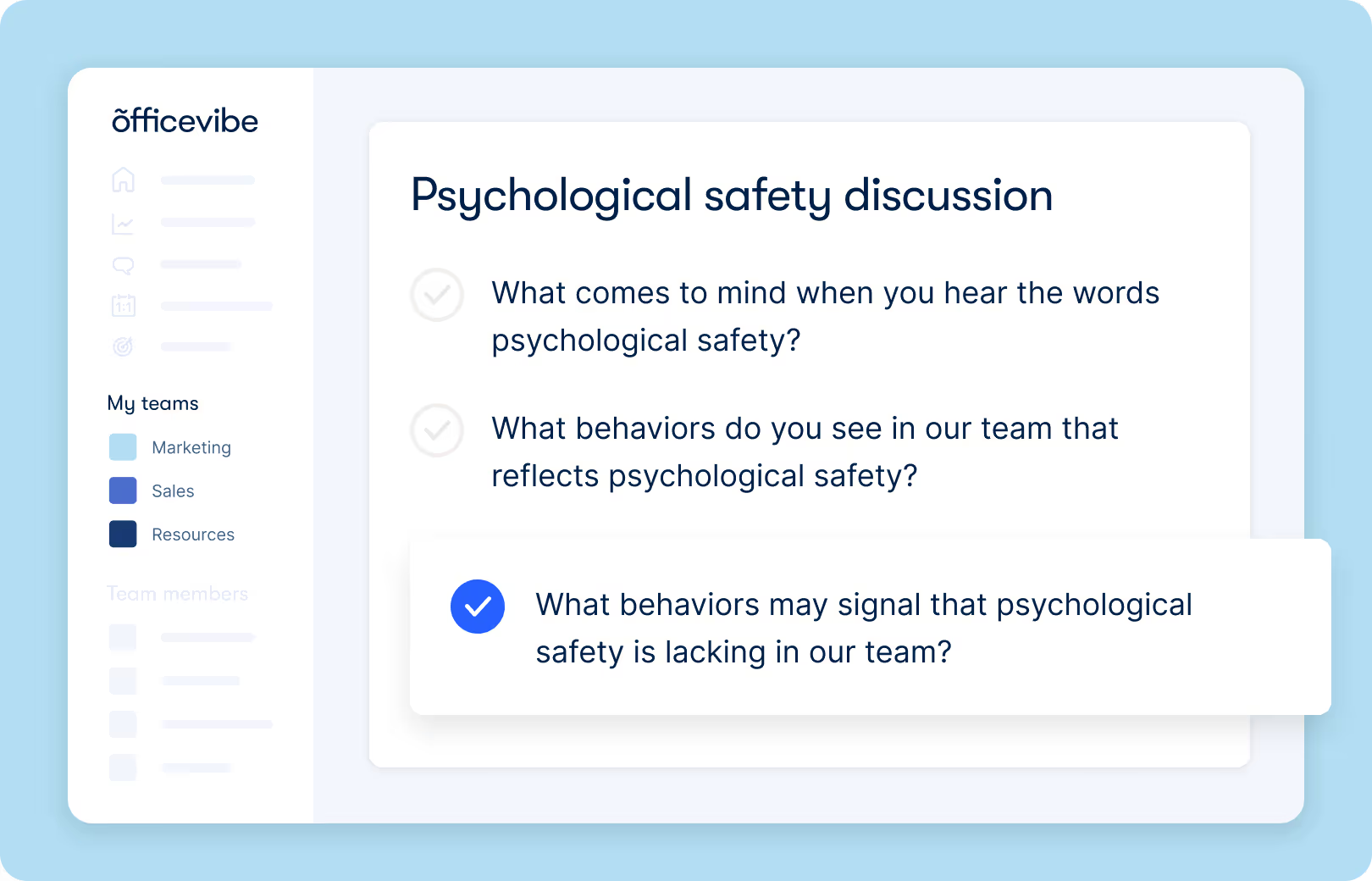Employee wellness surveys: Questions, templates, and more

Discover Workleap Officevibe's benchmark report on 12 key employee engagement metrics

Do your employees feel comfortable, engaged, and supported in the workplace? Are they experiencing a positive company culture and a healthy work-life balance? It's crucial to understand their well-being and address any emotional exhaustion, burnout, or anxiety they may be facing.
Employee wellness surveys offer a powerful tool to gain valuable insights, improve employee engagement, increase productivity, and foster genuine connections within your team. By delving deeper into the significance of these surveys, you can unlock opportunities to improve employee well-being and create a supportive environment.
Wellness surveys demonstrate that a company supports its employees through and through. Let's explore further the importance of employee well-being survey efforts and discover practical ways to implement them, ensuring your team's mental and physical health remains a top priority.
The importance of employee health and wellness
A happier employee performs better — that’s a fact. A recent study shows that happiness boosts productivity by about 12%. Corporate giants like PwC invest billions in employee wellbeing not just because it’s good PR, but because they know it pays off.
Poor physical health, mental health issues like anxiety and depression, burnout, and toxic workplace culture can cause serious harm to the overall health of an organization. An employee struggling with negative thoughts or high levels of stress is more likely to become disengaged, make mistakes, miss work days, or even quit their job.
With this in mind, managers and team leaders need to keep a finger on the pulse of their team’s well-being, emotional health, internal relationships, and psychological safety. The problem? Employee wellness can be hard to measure, especially if you work in a large organization and can’t communicate with each team member directly.
Anonymous employee wellness surveys can encourage your team to open up about their health, wellness, and workplace dynamics in a safe, judgment-free space. With the proper question structure, they can give you answers to important questions like:
- How do your team members evaluate their own health and wellness in the workplace?
- How much stress do your employees experience on a daily basis?
- Do your employees have access to stress management tools, mental health support, and other resources?
- Do your employees have access to proper healthcare, and how do they manage chronic health conditions?
- How does your team rate any ongoing wellness initiatives in your company?
{emphasize}If you’re sensing an employee is on the brink of burning out, use this template on work stress to gauge your team’s stress level and get to the bottom of what is triggering their anxieties.{emphasize}

Tips on how to conduct insightful surveys and measure employee wellness
An employee health and wellness survey can provide data on factors that influence employee well-being, like workloads, business management, stress, or relationships within the team. Such a wellness survey aims to assess team well-being, discover what drags employees down (too much work? not enough communication? external stress?), and give leaders valuable ideas to improve employee wellness.
Statistics like employee turnover rates and the number of absences are helpful, but wellness survey results provide more precise data directly from employees. A high turnover rate lets you know you have a problem; an employee engagement survey can help discover what the issue is and what can help solve it.
1. Ask the right questions
Employee wellness surveys need to be simple, clear, and detailed to provide useful feedback. Surveys should focus on specific data that can help you get to the root of problems like high turnover or conflicts within your company.
That's why both close-ended and open-ended questions should be included in your wellness survey. Close-ended questions give measurable data (“74% of the employees who took the survey rated communication with their managers 8 out of 10 or higher”), while open-ended survey questions provide personal insights (“several employees who completed the survey point out that they feel significantly more tired and less productive after 5 p.m.”).
2. Keep the employee surveys short
Your employee wellbeing survey should be short and the questions concise. If a survey takes more than a few minutes to complete, your employees may abandon the survey, leave questions unanswered, or provide meaningless answers where you need feedback.
Any time you survey employees, focus on what you want to know now and leave the rest for subsequent employee wellness surveys.
3. Communicate about the survey
To ensure maximum participation and engagement, it's crucial for managers to effectively communicate about the upcoming employee wellness survey. Send a company-wide email or use the internal communication platform to announce the survey's purpose, its importance in shaping a healthier work environment, and the anticipated timeline. Encourage transparency and assure employees that their feedback will be anonymous and valued.
By choosing a channel that reaches everyone and emphasizing the significance of their input, you'll foster enthusiasm and increase survey participation.
4. Offer incentives to employees
Offering incentives to team members who complete the wellness survey can increase survey participation rates. The reward can be simple, like a coffee coupon or a gift card raffle. Make sure to let your team know beforehand that a prize awaits them at the end of the survey.
Above all, show employees that their survey feedback matters.
5. Send a thank-you message
After the survey, you could send a message like, “Thank you for taking the time to answer employee wellness survey questions last week. We’ve noticed that many of you have concerns about fluctuating workloads. We’ll see what we can do to improve consistency.”
30 employee wellness survey questions
The specific questions you choose for your employee wellness survey may depend on your industry and your company’s structure. Here is a basic list of wellness survey questions to get you started:
Overall health and wellness
1. How are you feeling at this moment?
2. Do you feel like your organization supports your overall well-being?
3. Do you have access to comfortable and adequate office equipment and infrastructure (on-site and at home)?
4. Do you feel like the benefits provided by your organization support your overall health?
5. How can your organization help improve employee wellness?
6. Are you able to eat a nutritionally balanced lunch during office hours?
7. Do you have access to healthy snacks at work?
8. Do you feel like you can take breaks away from your computer during work hours?
9. Do you feel like your organization provides access to adequate wellness resources?
10. What wellness-promoting initiatives would you like to see in the workplace?
Workload, corporate culture, and stress management
11. Do you agree with the following statement: “I have a reasonable workload”? (Strongly agree, partially agree, disagree, strongly disagree, not sure)
12. Do you feel you can communicate openly with your manager about workloads and performance expectations? (Always, sometimes, rarely, never)
13. On a scale of 1 to 10, please rate your degree of work-related stress.
14. On a scale of 1 to 10, how strongly do you agree with the following: “My co-workers are friendly and supportive.”
15. In the past 6 months, have you considered looking externally for employment opportunities?
16. Is there a person within the organization you feel you can speak to about stress and other factors that influence your work performance?
17. Do you have access to resources that address stress, depression, anxiety, and other mental health issues?
18. On a scale of 1 to 10, how happy are you at work?
19. Would you recommend our company as a positive place to work?
20. In your opinion, what program or initiative might reduce your work-related stress?
Work-life balance
21. On a scale of 1 to 10, how much do you agree with the following: “I enjoy an optimal work-life balance at my current job”?
22. Is your lunch break long enough?
23. How often do you handle work-related tasks outside of work hours? (Daily, often, sometimes, never)
24. On a scale of 1 to 10, how difficult is it for you to balance your workload with childcare and other personal responsibilities?
25. Do you agree with the following: “My supervisors do their best to accommodate me when I need to take time off for personal reasons”? (Strongly agree, partially agree, disagree, strongly disagree, not sure)
26. Does your workload leave you enough time to pursue hobbies, personal activities, or career development?
27. On a scale of 1 to 10, how well would you say our organization supports employees in achieving a better balance between work and other responsibilities?
28. On a scale of 1 to 10, how high do you rate the importance of flexible hours and time off?
29. Do you agree with the following statement: “The pressure related to my personal workload is harming my productivity at work”? (Strongly agree, partially agree, disagree, strongly disagree, not sure)
30. In your opinion, what workplace initiative, wellness program, or policy can help you improve your work-life balance?
The insights you gather from answers to workplace wellness survey questions can help you devise solutions for improved employee well-being, like a broader benefits package, exercise and wellness programs, or ergonomic office furniture.
[ov_cta id="5117519"]
Employee wellness programs for a healthy and thriving workforce
Once you have your employee well-being survey results and a better sense of the employee health and wellness dynamics in your organization, it’s time to put your money where your mouth is and take actionable next steps. Poor employee health can lead to lower engagement or productivity. Relevant wellness initiatives could address the pain points you uncovered through the wellness survey.
Some might claim that employee wellness programs “don’t work.” These opinions, however, usually refer to other wellness initiatives that focus purely on the physical side of wellness, like workplace gyms or exercise programs. A holistic wellness program targets all aspects of employee well-being: physical, mental, social, professional, and financial.
Here are some examples of wellness initiatives your company might consider:
- Fitness programs: While this may not work for every organization, an on-site gym or a yoga class can help employees reduce stress, boost energy, and improve concentration. Companies with limited space can overcome this challenge by providing discounted gym memberships or sponsoring a fitness package that employees can use to fund their preferred activities, like pilates, swimming, or biking.
- Expanded health benefits: If your employees cut corners with their healthcare because of insufficient coverage, both their health and their work performance will be greatly affected. A more generous benefit package can encourage employees to take better care of their health needs.
- Healthy lunch and snack plans: How many of your team members skip lunch, cram in a burger before they rush back to the office, or try to stay alert with too much caffeine? Healthy catered lunches and balanced snacks will keep employees more energetic and productive throughout the day. Accommodating (if possible) the needs of people who follow vegan, gluten-free, or dairy-free diets will create a more inclusive workspace.
- Mental health programs: An effective mental wellness program starts with a corporate culture that recognizes the importance of mental health. When business leaders acknowledge issues like anxiety, depression, and burnout, employees are more likely to take advantage of a subsidized coaching program, therapy, or meditation classes.
- Financial wellness program: Employees dealing with debt or other financial constraints will be more stressed and less productive. Organization leaders can help their employees achieve financial well-being with initiatives like money management workshops, personalized financial coaching, and reimbursement for professional development courses and programs.
- Naps: A brief 15-30 minute nap can help employees fight the infamous afternoon slump and get back to work more alert and energized. Offices with insufficient space for a nap room could benefit from compact sleeping pods that allow workers to take quick naps.
Work-life balance ideas that cultivate productive employees
Today, most leaders understand that 80-hour workweeks are unsustainable and unhealthy. The WHO confirms that working 55 hours a week or more leads to more deaths than stroke and heart disease in the workforce, while research shows that shorter work hours increase productivity.
The COVID-19 pandemic and the rise of remote work brought the importance of work-life balance to the forefront. Many employees discovered that they like the flexibility of working remotely, while others voiced concerns about overwork and blurred boundaries between work and home hours. An organization that prioritizes work-life balance will have happier, more productive, and more loyal employees.
{emphasize}Here is how companies can help their employees find a better balance between work and family or personal life:
- Flexible leave policies: Many organizations now offer general paid time off instead of splitting it into sick days and vacation days.
- Flexible work hours: Employees appreciate being able to pick up their children from school or work four-day weeks during the summer.
- A limit on job-related communication: With all the benefits of telecommuting, remote employees can feel like they’re working around the clock. Let your people know that they are not expected to answer messages after a specific time.
- Family-friendly initiatives: Companies can support working parents by offering childcare subsidies, after-school programs, on-site daycare, flexible schedules, accommodations for pregnant and breastfeeding employees, and more.{emphasize}
Track and improve employee well-being with Officevibe
Employee engagement surveys can help you understand how your team members feel and what you can do to improve employee well-being. With Officevibe’s user-friendly pulse survey tool and clear reports, you can easily track your team’s vibe through an employee well-being survey and pinpoint where your company needs to adjust and improve.
Start putting the employee experience at the top of your priority list, and build a positive workplace culture where employees feel happy, engaged, and healthy.

Conducting employee wellness surveys prioritizes the well-being
In a nutshell, employee wellness surveys are a powerful way to understand and support your team's well-being. By asking the right questions and keeping surveys concise, you can gather valuable insights into their physical and mental health, work-life balance, and overall satisfaction.
These surveys help you identify areas for improvement and implement targeted initiatives that promote a healthier and more engaging work environment. Remember to communicate about the survey, offer incentives, and express gratitude for their participation. By taking action based on the survey results and sharing the outcomes, you show your commitment to their well-being — that you've got their backs as they have yours!
Employee wellness survey FAQ
What is an employee wellness survey?
An employee wellness survey is a valuable tool for gathering feedback from employees about their overall health and well-being, work-life balance, and work-related factors.
It provides a structured way to assess various aspects such as physical health, mental well-being, work and personal time management, job satisfaction, and employee engagement.
What are the benefits of employee wellness surveys?
Employee wellness surveys offer several benefits to both employees and organizations. They provide valuable data and insights into the overall well-being of your workforce, helping you identify areas for improvement and implement targeted interventions.
By understanding employees' needs, concerns, and perceptions, you can create a healthier and more engaging work environment that promotes productivity, satisfaction, and retention.
What do you do with employee wellness survey results?
Once you have collected employee well-being survey results, it's crucial to analyze the data and identify key findings. By examining patterns and trends, you can gain a deeper understanding of the factors affecting employee well-being and engagement. Use these insights to develop action plans, implement changes, and address specific concerns raised by employees.
Additionally, effective communication about the survey results is essential to keep employees engaged and informed. Sharing the aggregated results with your team and communicating the actions taken demonstrates transparency, shows that their feedback is valued, and fosters a culture of continuous improvement.
Give HR and managers the clarity, confidence, and connection to lead better every day.












